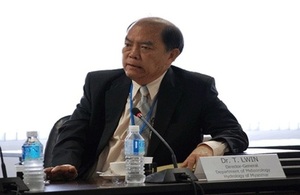UK and Burma’s ‘Weatherman’ welcome IPCC report on Climate Change
UN Intergovernmental Panel on Climate Change releases second report that deals with the impacts of climate change on humans and environment.

Dr Tun Lwin
On Monday 31 March, the UN Intergovernmental Panel on Climate Change (IPCC) published ‘Climate Impacts, Adaptation and Vulnerability’. This is the second volume of the collective Fifth Assessment Report, the latest and most comprehensive assessment of the science of climate change since the last publication of such a report in 2007.
The Foreign Secretary, William Hague, addressed the urgency of the report’s latest findings, stating that:
It is clear from the IPCC’s report that a two degree increase in the world’s temperature would be dangerous, and four degrees would be catastrophic. But that is the likely trajectory, unless there is unprecedented global cooperation to bring down emissions. No country would be left unaffected. Governments everywhere have to act.
The Foreign Secretary’s Special Representative for Climate Change, Sir David King, agreed that action is required now:
We must avoid the impacts of dangerous climate change. The results of a failure to take action will be widespread, with serious consequences for human health, global food and resource security and economic prosperity. There are limits to how much we can adapt to these impacts and only by working together to secure an international agreement to successfully lower carbon emissions can we hope to meet the climate challenge.
The report provides strong evidence of the widespread and consequential impacts of climate change, as well as the need to consider adaptation options for those impacts that we can no longer avoid.
Relating the findings of the report to the climatic changes in Burma, renowned meteorologist Dr U Tun Lwin said:
The thematic areas from the second UN CLIMATE CHANGE IMPACTS & MITIGATION REPORT such as water security, extreme weather and climate impacts are all threatening to Myanmar, which is the second most impacted country in the world as far as impacts from climate change and natural disasters are concerned. Currently the levels of UV and the Heat Index are rising, especially in the summer and pre-monsoon seasons. Myanmar’s monsoon characteristics have drastically changed since 2006 such as:
-
Later onset of monsoon season by as much as 15 days
-
Earlier withdrawal of monsoon season by as much as 25 days
-
A shortening of the rainy season by as much as 40 days
-
A disappearance of depressions in the Bay of Bengal by as much as 40%.
In addition to these impacts, Myanmar is expected to have a temperature rise of 5°C by the end of this century according to the UK’s Hadley Centre, leading to increased scarcity of water resources.”
Note for editors:
The full Summary for Policymakers for Working Group 2 Report will be published here. Dr U Tun Lwin’s website can be viewed here
All the latest news is available on the Foreign Office page of the gov.uk website at: www.gov.uk/fco
Follow the Foreign Secretary on facebook and on twitter: @WilliamJHague Follow the Foreign Office on twitter @foreignoffice Follow the Foreign Office on facebook and Google+ Subscribe to the announcements feed or email alerts to get our latest news and announcements.